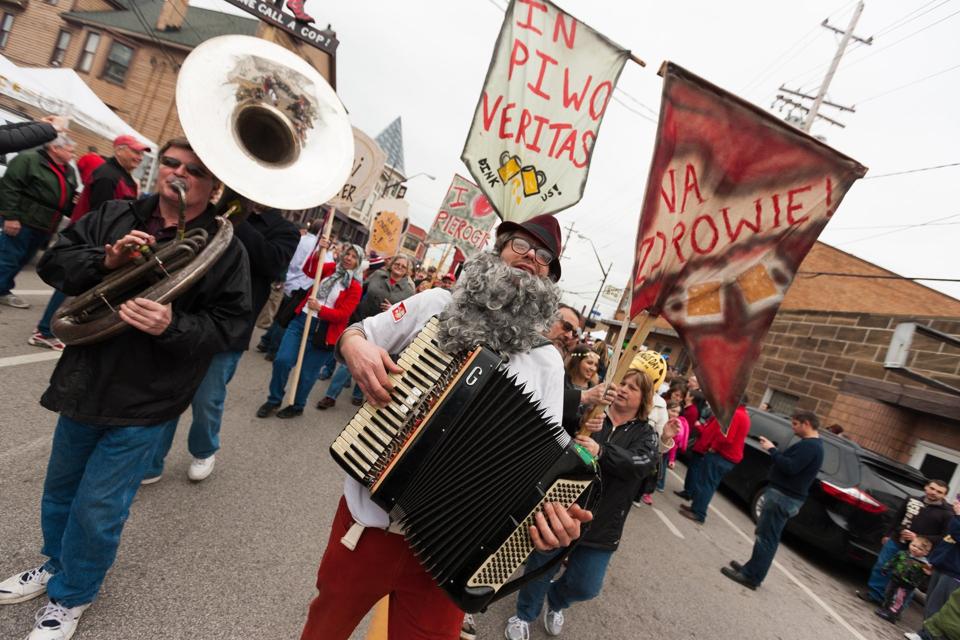It’s common to think of pre-Lenten festivities such as Mardi Gras and Carnival but Polish Americans mark the end of Lent with community fun right after Easter Sunday.
This public celebration known as Dyngus Day, which is also known by the name, Śmigus-dyngus, falls on Easter Monday. For 2025, its calendar date is April 21.
This Polish American tradition not only involves people affectionately spraying others, as an act of cleansing or purification, but the day involves another interesting practice. It involves the tapping of people with pussy willow branches, reflecting a practice traditionally used in Poland that uses this plant in place of palms on Palm Sunday.
Unique customs aside, parades and public parties bring out both those of Polish and non-Polish heritage to celebrate.
Where is Dyngus Day celebrated in the U.S.?
Dyngus Day in the United States occurs across various parts of the United States. Here are some of them.
Touted as “Dyngus Day Capital of the World,” Buffalo’s Polish history dates back to the 1860s and originated from this Western New York city quickly growing amid industrialization.
Recruiters were in Poland looking for workers to fill roles in the community and, from there, several areas sprung up in Buffalo that were almost exclusively Polish – like the East Side, where most Dyngus Day Celebrations happen today,” explained Andy Golebiowski, host of the Polish American Radio Program in Buffalo.
Dyngus Day is big in Buffalo
According to Golebiowski, thousands of Polish people made their way to Buffalo where they started to form social groups, such as theatrical and literary circles, to maintain their culture. In 1873, they founded the parish St. Stanislaus, which is still standing and the oldest Polish Roman Catholic church in Buffalo.
“They kept their cultural traditions alive,” said Golebiowski.
Eventually, as Buffalo grew, most moved to the outer suburbs or other neighborhoods, but their influence carried on. In Buffalo, Golebiowski said that Dyngus Day celebrations were happening as early as the 1900s when choir societies and church societies threw parties to mark the holiday.
Overtime, these celebrations eventually died down, but they reemerged in the 1960s when Buffalo’s Chopin Singing Society began hosting Dyngus Day parties to raise funds for the choir. Surrounding bars and churches, like St. Stanislaus, started hosting corresponding celebrations.
“When the society moved to the suburbs of Buffalo, the city’s bars carried on the tradition, throwing parties with imported Polish beer and free buffets,” said Golebiowski. “This is when Dyngus Day, as it is celebrated now in Buffalo, really started to emerge.”
In the 1990s, Polish Buffalonians began to move away, but it was made certain that Buffalo’s Dyngus Day festivities remain. That same decade, a Dyngus Day party was spearheaded on Buffalo’s East Side that continues to this day. “Every year, the celebration is still so packed that I can’t even get in!” exclaimed Golebiowski, who helped to restart this tradition.
Dyngus Day is commemorated in Buffalo in many ways, including an annual parade in the city’s Old Polonia district that’s organized by the Dyngus Day Buffalo. According to the group’s website, the parade evolved from featuring a group of pickup trucks and a single band performing from a trailer to floats, fire truckers and festive marchers.
Golebiowski, a Buffalo native whose parents emigrated over from Poland after World War II, cites that as many as 25 percent of people in Buffalo have Polish heritage.
“But as the neighborhood has changed, and residents from other cultures have moved in, it’s not just the Polish community that celebrates,” he said. “You’ll see other kids and parents from all different communities carrying pussy willows, picking-up candy from the parade, and joining in on the fun.”
Dyngus Day in Cleveland
Joining Buffalo in a celebration of Dyngus Day is fellow Rust Belt city, Cleveland. 2025 will mark the 15th year of this Ohio city’s celebration.
“What started as a grassroots celebration has grown into a full-blown festival in the heart of the Gordon Square Arts District,” stated Adam Roggenburk, Dyngus Day event producer and president of Heritage Productions. “It’s a day of joy, tradition and community.”
The event’s festivities encompass traditional polka music and dancing, a pierogi eating contest, the crowning of Miss Dyngus Day, a street festival, an all-day performance by polka personality, DJ Kishka.
According to Roggenburk, Cleveland has deep Polish roots, and its neighborhoods such as Slavic Village have long been cultural hubs.
“Dyngus Day is a direct reflection of that heritage and it’s a way for us to honor and celebrate the past while creating something vibrant and fun that brings everyone together, no matter their background,” he said.
For Cleveland’s Dyngus Day celebration at Gordon Square, there is an admission ticket price of $14 that provides access to all offerings. Local bars and restaurants will also hold their respective festivities. A complete event schedule and additional information is available through this website.
“Dyngus Day captures that perfectly – the energy is really incredible!” said Roggenburk. “We shut down streets, we dance in the middle of the day, we eat pierogies. There’s something very Cleveland about taking a traditional holiday and turning it into the most spirited polka party you’ve ever seen.”
Other Dyngus Day commemorations across the United States stretch across Indiana, within South Bend and Michiana; Chicago and Pittsburgh, with this Pennsylvania city having a fundraising race.

